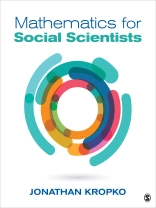Written for social science students who will be working with or conducting research,
Mathematics for Social Scientists offers a non-intimidating approach to learning or reviewing math skills essential in quantitative research methods. The text is designed to build students’ confidence by presenting material in a conversational tone and using a wealth of clear and applied examples. Author Jonathan Kropko argues that mastering these concepts will break students’ reliance on using basic models in statistical software, allowing them to engage with research data beyond simple software calculations.
Jadual kandungan
Part I: ALGEBRA, PRECALCULUS, AND PROBABILITY
1. Algebra Review
Numbers
Fractions
Exponents
Roots
Logarithms
Summations and Products
Solving Equations and Inequalities
2. Sets and Functions
Set Notation
Intervals
Venn Diagrams
Functions
Polynomials
3. Probability
Events and Sample Spaces
Properties and Probability Functions
Counting Theory
Sampling Problems
Conditional Probability
Bayes′ Rule
PART II: CALCULUS
4. Limits and Derivatives
What is a Limit?
Continuity and Asymptotes
Solving Limits
The Number e
Point Estimates and Comparative Statics
Definitions of the Derivative
Notation
Shortcuts for Finding Derivatives
The Chain Rule
5. Optimization
Terminology
Finding Maxima and Minima
The Newton-Raphson Method
6. Integration
Informal Definitions of an Integral
Riemann Sums
Integral Notation
Solving Integrals
Advanced Techniques for Solving Integrals
Probability Density Functions
Moments
7. Multivariate Calculus
Multivariate Functions
Multivariate Limits
Partial Derivatives
Multiple Integrals
PART III: LINEAR ALGEBRA
8. Matrix Notation and Arithmetic
Matrix Notation
Types of Matrices
Matrix Arithmetic
Matrix Multiplication
Geometric Representation of Vectors and Transformation Matrices
Elementary Row and Column Operations
9. Matrix Inverses, Singularity, and Rank
Inverse of a (2 x 2) Matrix
Inverse of a Larger Square Matrix
Multiple Regression and the Ordinary Least Squares Estimator
Singularity, Rank, and Linear Dependency
10. Linear Systems of Equations and Eigenvalues
Nonsingular Coefficient Matrices
Singular Coefficient Matrices
Homogeneous Systems
Eigenvalues and Eigenvectors
Statistical Measurement Models
Mengenai Pengarang
Jonathan Kropko is a professor in the Department of Politics at the University of Virginia, where he also serves on the steering committee of the Quantitative Collaborative, an interdisciplinary research initiative for applied statistics in the social sciences. Previously, he held a postdoctoral research fellowship at the Applied Statistics Center at Columbia University and was a statistics consultant at the H. W. Odum Institute for Research in the Social Sciences at the University of North Carolina. He holds degrees in mathematics (BS) and political science (BA) from Ohio State University, and earned a Ph D in political science from the University of North Carolina in 2011. He is a specialist in political methodology, with a focus on missing data imputation, time series, and measurement methods.












